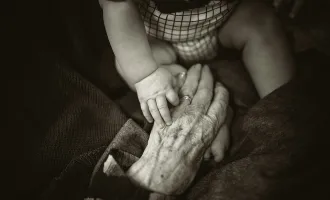This Date in UCSF History: Principles of New Medicine
[Originally published in Synapse - The UCSF student newspaper, April 25, 1975] A woman with a large skin tumor had a recurring dream that she was climbing a tall mountain on a narrow trail to a place she needed to go. Many other people were on the same trail.
One night she came to a stretch of trail, which was blocked by a large healthy tree. As she got closer to the tree she noticed a strange ugly growth at the base of the trunk.
As she went up to examine the growth, someone behind her asked, “What is that?” with a voice full of fear. The woman answered, “I don't know,” grabbed hold of the growth and lifted herself up to the next level of the trail.
The next day, the woman showed a dramatically positive change in her attitude toward her life.
This allegory cited by Harold Stone who works with the Center for the Healing Arts in Los Angeles, reflects one of the primary themes of a weekend conference on healing recently held at UC Santa Cruz: ultimately, people must heal themselves.
The conference was organized by Dr. Ken Pelletier, a research psychologist in neurophysiology at Langley Porter Neuropsychiatric Institute, and David Bresler, Director of the Acupuncture Research Project, UCLA School of Medicine.
The theory and practice of the emerging “new medicine,” including aspects of the seemingly diverse systems of Chinese medicine, biofeedback, meditation, orthomolecular nutrition and autogenic training, is based upon the principle of self-healing.
Modern biofeedback equipment and Indian wool paintings both reflect meditative states that can affect one's physiology, said Pelletier.
This principle has profound implications for the future of “old medicine” as practiced in most modern western healing institutions.
James Fadiman, a professor at Stanford and Sonoma State University, said that currently, most medical research is aimed at discovering external causes for pathological symptoms.
Instead, he asked, why aren't researchers studying the ways people can control and strengthen their internal resources and thereby transcend their “diseases” — a process long recognized in western medicine as “spontaneous remission.”
Once understood, said Fadiman, this technique could be taught to others. Fadiman said that healers should be paid to help us keep well, not to take responsibility away from us when we are sick.
To deny patients full knowledge about their own illness, he continued, is to stop them from the possibility of using their experience to raise themselves to a new level of consciousness, as did the woman with the skin tumor.
Eric Peper, a research psychologist at Stanford Research Institute, discussed biofeedback, a recent extension of the maxim, “heal thyself.” He said that biofeedback is based on the principle that whatever you can measure, you can control. Peper said that several medical students at UC Davis taught themselves to voluntarily raise the temperature in their hands by controlling blood flow to different regions.
They then applied the same technique to their scrotum. Peper said this proved to be an effective birth control method, significantly reducing their sperm counts if practiced twice a day for a few minutes at a time. (This study was not allowed to be published by school authorities, said Peper, for “fear of damaging the school's image.”)
Most disease symptoms, Peper said, can be seen as a form of biofeedback: the body is giving direct feedback and saying that something has got to change. He cited the germ theory as one primary block to overcoming disease.
In the era before the germ theory, he said, people had the problem of equating responsibility for illness with guilt for moral crimes. Now, however, people go to the opposite extreme and believe that they have no control over their cancer or heart disease.
Responsibility, Peper said, is a double-edged sword: if you believe that you have nothing to do with causing your illness, then you can die believing that you can't do anything about it. If on the other hand, you take responsibility for cause, then you can take responsibility for cure.
Next time you have a cold, said Peper, ask yourself, “Why am I doing this — what is the message?”


